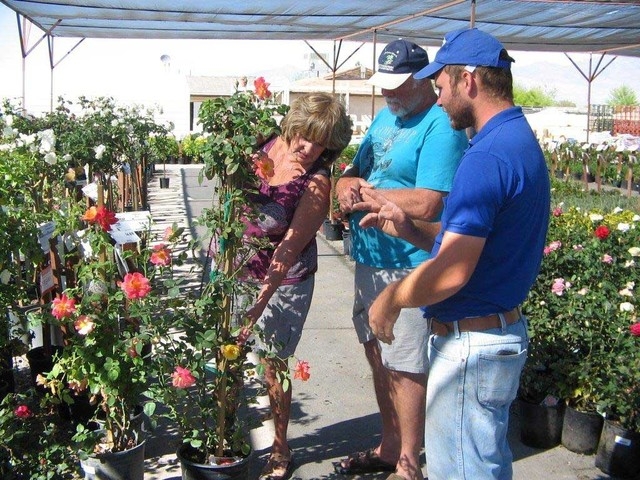
If you are sprucing up your yard and garden in the harsh desert land, you may want to heed some advice from experts in the field.
You can grow so much more than just cacti in the desert soil as long as you prepare the planting area according to Tyson Taylor, store manager of Pahrump’s Star Nursery. But, you cannot just dig a hole and plant something in the native soil. It’s best to add a half and half mixture of organic material with the soil.
Taylor’s choice is a product called Paydirt, a planting mix of soil and mulch.
“It makes an ease of transition from this not so good ‘poof dirt’ easier for the plant and less likely to go into shock,” he said.
He described “poof dirt” or “poof dust” found everywhere in the valley as a combination of silt and clay which can act more like a liquid than a soil; in some places it can be hard as a rock.
Star Nursery shopper Jay Brown has successfully planted carrots, beets, potatoes and his favorite — peppers. He was at Star Nursery looking for Mexico Big Jim peppers which he said have an “excellent flavor and good bite.”
Pepper and tomato plants are usually susceptible to freezing temperatures which should be gone by the third week of April, according to Taylor.
“The old saying out here is when the mesquite trees bloom out is when we’re out of frost,” Taylor said. “I’ve still seen us freeze after the mesquite trees bloom out, but that seems to be the rule of thumb around here in Pahrump.”
Both annuals and perennials grow well here including petunias, cosmos, marigolds and vincas. Also, bulbous plants like tulips, hyacinths and daffodils are a good choice. The bulbs should be dug up and refrigerated for a few months before replanting. Taylor said oleanders are not the best plants for this climate since they usually get damaged from the cold by the end of winter.
However, roses really flourish in the Pahrump Valley.
“People will plant rose bushes as a desert accent which will do well, give you some color in the yard, and I mean who doesn’t like a good rose,” Taylor said.
Frank Eberflus, owner of Land Art Landscaping in Pahrump, said lots of rain this past winter resulted in more weeds to combat residentially and commercially. Weeds are even sprouting up among rocks and stones.
“We have a lot of wind around here and we exchange a lot of real estate,” Eberflus said. “What I mean by that is that when the dirt flies in the air that accumulates inside your rocks. Even if you have a weed barrier in there, the rocks have a tendency to collect that little bit of soil, enough to make that seed pop so that you get a weed.”
Concentrated weed killers are the most popular since they can be diluted according to different ratios for different strengths depending on the amount of weeds to be knocked down, according to Taylor. The main ingredient found in many of the brand name weed killers is glyphosate. There are different sizes and price options for gardeners.
Aside from weeds to spoil an otherwise nice looking garden, aphids are a nuisance. Taylor said they come in a variety of colors, not just green. He said for the first time in four years he has seen the bark aphid appear mostly on ash trees. An organic spray like neem oil is one way to get rid of them. There is an even more environmentally-friendly option.
“A nice alternative which you don’t have to spray is ladybugs that we carry,” Taylor said. “That is an organic solution; you release them at night and they crawl up the tree and start munching away at the aphids.”
Ladybugs also feed on spider mites, mealy bugs and other pesky insects.
If someone prefers to plant fruit trees, peaches, apricots and plums are very popular. But, he said that fig and citrus trees are another story. They don’t necessarily do well. The fruit trees he sells are “best suited” for the desert weather and many need “chill hours”, or days under 45 degrees to produce the best fruit.
“I have seen a lot of fig trees do well out here, but it seems that at least the first couple of winters they do get damaged by the cold,” Taylor said. “And there are things like citrus that I carry, but citrus is one of those plants I definitely recommend to put into a pot and bring it inside for the winter because they will not handle our cold.”
No matter what someone chose to plant in their garden, a good irrigation system is vital. Dan Snowden, owner of Snowden Landscape, Inc. in Pahrump recommends regular maintenance on irrigation/timer systems, especially the drip systems.
“Drip systems need to be gone through, the emitters get plugged up and stuff, and valves are leaking from the cold winter,” Snowden said. “If people don’t get on top of that, all of a sudden they’ve got dead stuff in their yard.”